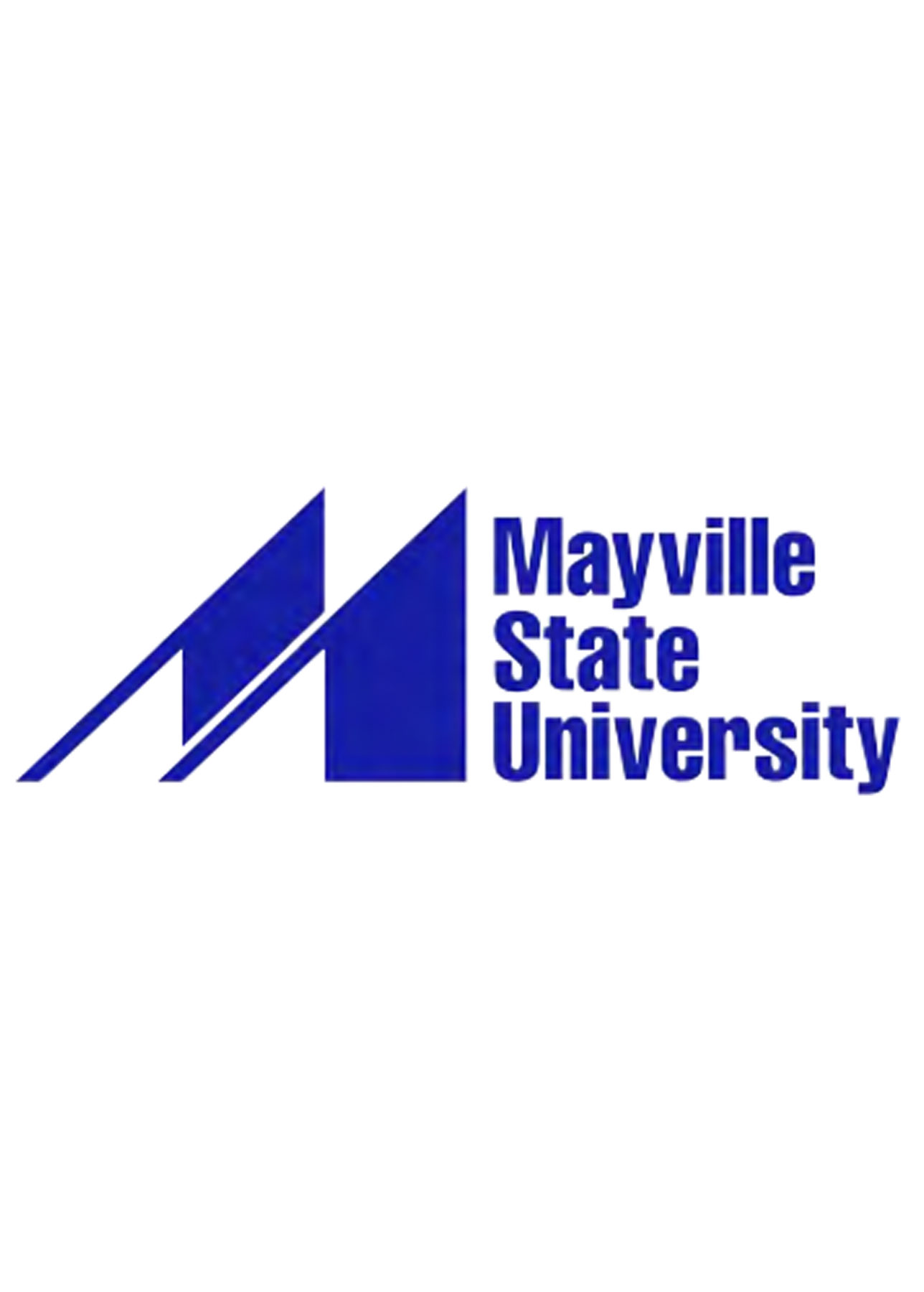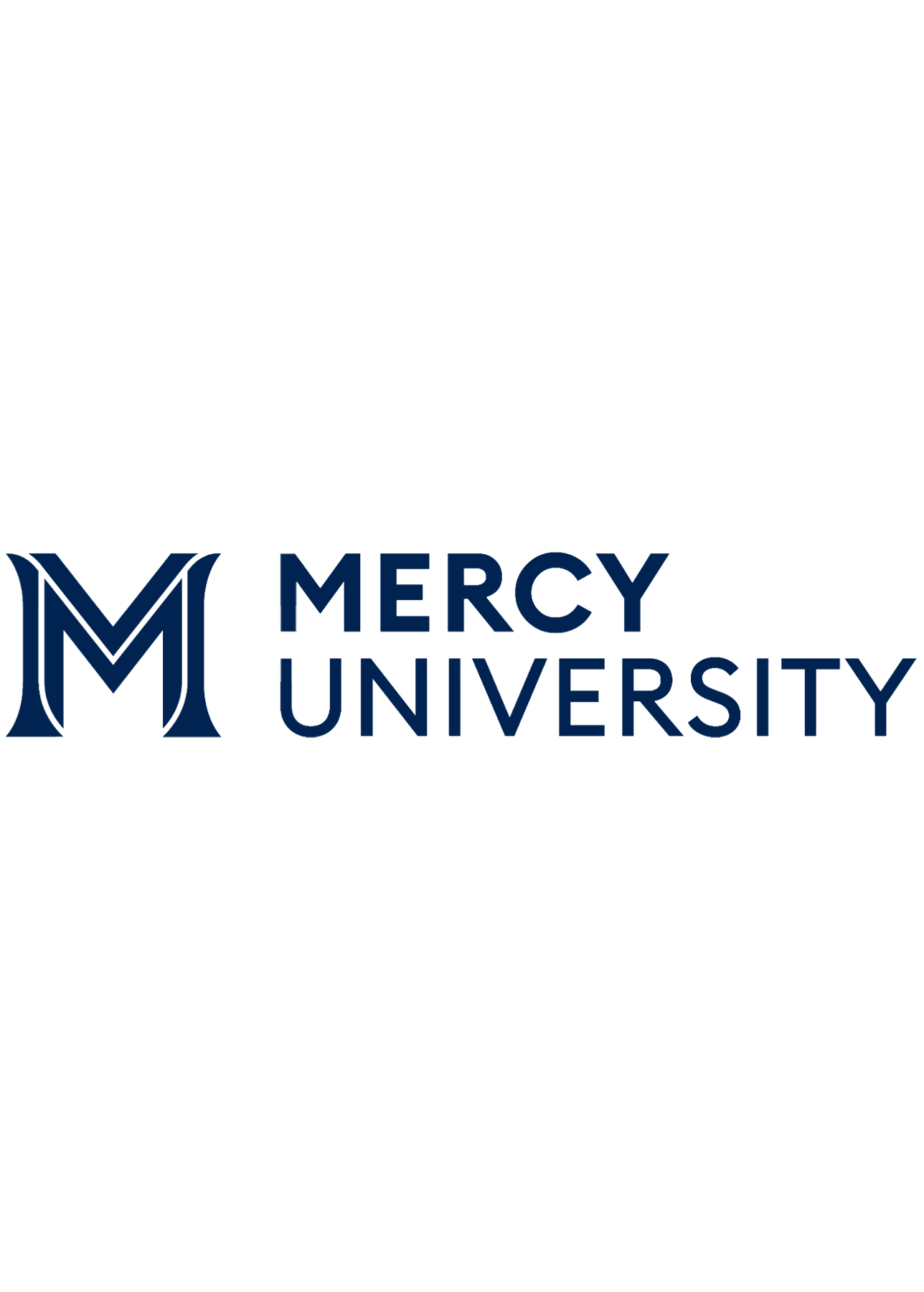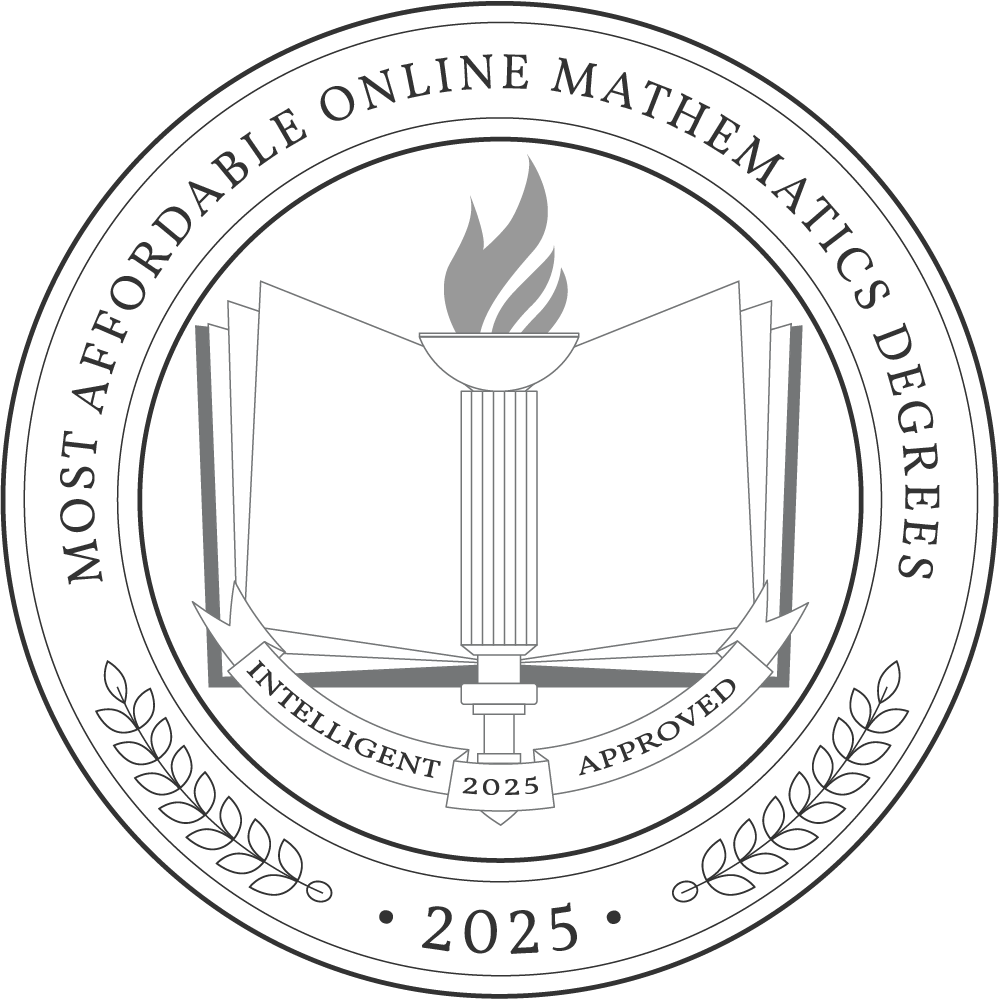An online bachelor’s degree in mathematics will prepare students for entry- and mid-level jobs as well as further study in the rapidly developing math field. Graduates with this degree can work as mathematicians and statisticians, actuaries, operations research analysts, and more. According to the Bureau of Labor Statistics, the median annual wage for individuals in the math field is $101,460.
To get a better return on investment, many students seek out the cheapest online math degree. However, it’s important to also find programs that provide a high-quality mathematics education. Intelligent.com compiled this list of the most affordable online mathematics degree programs to help prospective students find strong programs that come at a great value. This article also includes a breakdown of college costs, financial aid costs, and an in-depth career outlook.
Why Trust Us
The Intelligent.com Higher Education Team is dedicated to providing students with independent, equitable school and program rankings and well-researched resources. Our expert-driven articles cover topics related to online colleges and programs, paying for school, and career outlooks. We use data from the U.S. Department of Education’s College Scorecard, the National Center for Education Statistics, and other reputable educational and professional organizations. Our academic advisory team reviews content and verifies accuracy throughout the year for the most current information. Partnerships do not influence rankings or editorial decisions.
- Analyzed over 2,000 national, accredited, and nonprofit colleges and universities
- 800+ rankings pages are reviewed and updated yearly
- Content is informed by reputable sources, surveys, and interviews with academic advisors and other experts
- Over 100 data points are reviewed for accuracy and quality throughout the year, including sources
How we rank schools
Our list features the Most Affordable Online Mathematics degree programs at top colleges nationwide. Each school featured is a nonprofit, accredited institution — either public or private — with a high standard of academic quality for post-secondary institutions.
We evaluated each school’s program on tuition costs, admission, retention and graduation rates, faculty, reputation, and the student resources provided for online students. We collected data from trusted sources like the National Center for Education Statistics, individual school and program websites, school admissions counselors, and other data sources. Then, we calculated the Intelligent Score on a scale of 0 to 100 based on the following criterion:
Academic Quality:
- Admission rate versus enrollment rate
- Retention rate of students who return after year one
- Accreditation status (regional and programmatic)
- Nonprofit status, both private and public institutions
Graduation Rate
- Overall graduation rate
- Total number of currently enrolled students, including diversity metrics
- Student-to-faculty ratio
Cost and ROI
- In-state and out-of-state per-credit tuition rates and fees
- Required credits to graduate
- Earning potential after graduation
- Availability of federal student loans, scholarships, and other financial aid options
Student Resources
- Available student services for online-only and hybrid programs
- On-campus amenities like tutoring centers and the number of libraries
Read more about our ranking methodology.
Most Affordable 18 Online Mathematics Degree Programs
FiltersInstitution Type
Status
- Intelligent Score
- Alphabetically By University Name
- Acceptance Rate
- Enrollment
- In-state Graduate Tuition
- Out-of-state Graduate Tuition
- In-state Undergraduate Tuition
- Out-of-state Undergraduate Tuition

Eastern New Mexico University
Intelligent Score: 98.29In-state: $4,074
Out-of-state: $6,114
In-state: $5,351
Out-of-state: $5,351
SAT: 950-1160
ACT: 17-23
Resident: $175
Non-Resident: $257
Online
Higher Learning Commission
120

Central Methodist University
Intelligent Score: 98.12In-state: $5,950
Out-of-state: $5,950
In-state: $6,075
Out-of-state: $6,075
SAT: N/A
ACT: N/A
$270
Online, On-Campus
Higher Learning Commission
120

Southern New Hampshire University
Intelligent Score: 97.12In-state: $9,600
Out-of-state: $9,600
In-state: $18,810
Out-of-state: $18,810
SAT: N/A
ACT: N/A
$330
Online
New England Commission of Higher Education
120

Mayville State University
Intelligent Score: 96.42In-state: $6,025
Out-of-state: $9,038
In-state: $5,795
Out-of-state: $5,795
SAT: 880-1250
ACT: 18-23
$337
Online
Higher Learning Commission
120

Louisiana State University
Intelligent Score: 96.39In-state: $8,038
Out-of-state: $8,038
In-state: $9,132
Out-of-state: $9,132
SAT: 1090-1300
ACT: 23-28
$325
Online
Southern Association of Colleges and Schools Commission on Colleges
120

Indiana University East
Intelligent Score: 95.71In-state: $9,815
Out-of-state: $36,194
In-state: $9,786
Out-of-state: $9,786
SAT: 1120-1350
ACT: 24-31
Resident: $57
Non-Resident: $378
Online
Higher Learning Commission
120

Thomas Edison State University
Intelligent Score: 94.65In-state: $14,742
Out-of-state: $16,926
In-state: $22,623
Out-of-state: $22,623
SAT: Not Required
ACT: Not Required
Resident: $419
Non-Resident: $545
Online
Middle States Commission on Higher Education
120

University of North Dakota
Intelligent Score: 92.74In-state: $8,540
Out-of-state: $12,810
In-state: $11,060
Out-of-state: $11,060
SAT: 1000-1230
ACT: 20-27
$384
Online, On-Campus
Higher Learning Commission
120

Chadron State College
Intelligent Score: 92.57In-state: $5,208
Out-of-state: $5,236
In-state: $4,185
Out-of-state: $4,185
SAT: N/A
ACT: N/A
$309
Online
Higher Learning Commission
120

Ottawa University
Intelligent Score: 91.25In-state: $29,980
Out-of-state: $29,980
In-state: $15,576
Out-of-state: $15,576
SAT: 750-990
ACT: 18-22
$499
Online, On-Campus
Higher Learning Commission
120

University of New Hampshire College of Professional Studies
Intelligent Score: 89.04In-state: $15,520
Out-of-state: $32,860
In-state: $14,170
Out-of-state: $14,170
SAT: 1090-1280
ACT: 24-30
Resident: $314
Non-Resident: $379
Online
New England Commission of Higher Education
120-121

University of Illinois at Springfield
Intelligent Score: 88.95In-state: $14,317
Out-of-state: $33,824
In-state: $15,016
Out-of-state: $15,016
SAT: 1200-1460
ACT: 27-33
$267
Online, On-Campus
Higher Learning Commission
120

Bellevue University
Intelligent Score: 88.92In-state: $7,176
Out-of-state: $7,176
In-state: $10,710
Out-of-state: $10,710
SAT: N/A
ACT: N/A
$449
Online
Higher Learning Commission
127

Bushnell University
Intelligent Score: 88.48In-state: $47,000
Out-of-state: $47,000
In-state: $34,410
Out-of-state: $34,410
SAT: 920-1050
ACT: 17-18
$495
Online
Northwest Commission on Colleges and Universities
124

Maryville University
Intelligent Score: 86.1In-state: $24,766
Out-of-state: $24,766
In-state: $14,346
Out-of-state: $14,346
SAT: N/A
ACT: N/A
$540
Online
Higher Learning Commission
128

Indiana Wesleyan University
Intelligent Score: 85.19In-state: $28,184
Out-of-state: $28,184
In-state: $13,512
Out-of-state: $13,512
SAT: 1010-1200
ACT: 21-27
$1,149
Online
Higher Learning Commission
120

Mercy College
Intelligent Score: 84.97In-state: $19,578
Out-of-state: $19,578
In-state: $16,686
Out-of-state: $16,686
SAT: 930-1110
ACT: 18-26
$916
Online
Middle States Commission on Higher Education
120

Liberty University
Intelligent Score: 84.01In-state: $14,791
Out-of-state: $14,791
In-state: $7,935
Out-of-state: $7,935
SAT: 1040-1250
ACT: 21-29
$390
Online
Southern Association of Colleges and Schools Commission on Colleges
120
Cost Breakdown for an Online Mathematics Degree Program
When deciding how much you can afford to pay for an online mathematics degree, it’s helpful to understand the various costs associated with these programs.
Tuition
Tuition is the cost most commonly associated with college degree programs. Full-time students in undergraduate degree programs typically pay a flat, per-term tuition rate, while part-time students pay per credit hour. According to the Education Data Initiative, the average cost per credit hour at four-year institutions (public and private) is $694. Students should consult with their school’s financial aid office to determine their tuition rate for an online mathematics degree program, how tuition is assessed, and what payment options students have.
Fees
Schools often charge students additional fees to pay for infrastructure or resources not covered by tuition. For example, schools may charge online students a fee to cover virtual classroom technology costs. Some fees are recurring, while others only need to be paid once. For more specific information on the fees a school or program charges, speak to a financial aid counselor.
Personal technology
In order to succeed in an online program, a reliable computer and high-speed internet access are essential. Students in mathematics degree programs may also need specialized software related to their coursework. Before you begin your program, review your current technology set-up and determine if you need to upgrade your hardware or internet service. If you do, find out if your school partners with any retailers or companies to offer student discounts on technology and equipment.
Books and supplies
According to the Education Data Initiative, the average postsecondary student spent between $628 and $1,200 for books and supplies during the 2021-2022 academic year. Students should include funds for books and other learning materials in their budget. They should also consider whether they need additional supplies, such as business clothes for internships or furniture for an at-home learning space.
Factors Influencing the Cost of an Online Mathematics Degree
There are a number of factors that determine what an individual school charges students for tuition.
Public vs. private institution
A major cost determinant is whether the school is public or private. Public institutions receive state and federal government funding to subsidize tuition costs, particularly for students who live in the state where the school is located. Tuition is often lowest for in-state students at public universities, which charge out-of-state students a higher tuition rate. However, some schools may charge students the same tuition for online programs, regardless of where they reside. Private colleges don’t receive government funding and must rely on tuition, endowments, investments, and other revenue sources to fund operations. Therefore, they charge higher tuition rates, although they don’t have separate in-state and out-of-state tuition rates.
Nonprofit vs. for-profit
In the U.S., all public and most private universities are non-profit, which means they must reinvest revenue into the institution through faculty and staff salaries, infrastructure, student services, and more. For-profit schools operate like corporations, with the primary goal of earning a profit. Although for-profit schools may charge less, they also typically invest less into their operations, which can impact the quality of education students receive. They also have a greater incentive to use deceptive business practices to attract students. Students considering for-profit schools should carefully review how the institution invests its money and its student outcomes.
Student military status
Schools may charge active-duty servicemembers, veterans, and their spouses or children a discounted tuition rate. Students who think they might be eligible should consult the school’s financial aid office for more information.
Number of credits and completion time
Students must complete 120 credits to earn an online bachelor’s in mathematics degree. Those who have previously earned credits from an associate degree or unfinished bachelor’s degree program may be able to apply those credits to their mathematics degree. Many schools offer degree completion programs, which are designed to allow a maximum number of transfer credits and reduce the amount of time and money students need to spend to finish their degree.
How to Pay for an Online Mathematics Degree
Students and families have various options when it comes to paying for an online mathematics degree.
Scholarships
Scholarships are considered “gift aid” because they’re money for education that doesn’t have to be repaid. Most schools offer scholarships, either based on financial need or merit. Other sources for scholarships include professional business organizations, community groups and nonprofits, private endowments, and more. For need-based scholarships, students typically must submit a FAFSA to be considered.
Grants
Like scholarships, grants don’t need to be repaid. Most grants, such as the Pell Grant, are awarded based on financial need. Grants can come from schools, state and federal governments, and private organizations.
Employer tuition assistance
Many employers offer tuition assistance benefits to help employees pay for their education. In most cases, students pay for courses upfront, and employers reimburse them for some or all of the cost of the course after successful completion. If you’re planning on working while earning an online bachelor’s in mathematics, inquire about whether they offer tuition assistance benefits.
Out-of-pocket
When students pay their own money directly to a school to cover tuition and expenses, this is considered out-of-pocket. While some students pay their full tuition out-of-pocket with no additional financial aid, it’s more common for students to use a combination of out-of-pocket payments and financial aid to cover all their education expenses. Many schools allow students to make out-of-pocket tuition payments in a lump sum at the start of the term or in installments throughout the academic year.
Federal student loans
The U.S. Department of Education offers Direct Subsidized Loans and Direct Unsubsidized Loans to undergraduate students as part of the Federal Student Aid (FSA) program. Students use the Free Application for Federal Student Aid (FAFSA) to apply for student loans and other forms of financial aid from the federal government. Federal student loans have interest rates and repayment terms set by Congress that are generally more favorable than private education loans. More information about applying for student loans through the FAFSA is included in the next section.
Private education loans
The other option for student loans is private education loans from lenders like Sallie Mae, SoFi, and Ascent. Individual lenders set interest rates and repayment terms for these loans based on current market rates and the borrower’s credit history. Therefore, interest rates may be higher on these types of loans than on federal student loans. Students who need to take out private education loans should watch interest rates throughout the year to lock in the most favorable terms possible.
Work-study
Another component of the federal student aid program, work-study jobs pay students for working on-campus or remote jobs for their school. Work-study positions exist in a variety of college departments, and online students should inquire whether their school has remote work-study positions available. Students with work-study jobs earn at least the federal minimum wage, but certain positions may pay more.
Scholarship Database
Intelligent Scholarship Finder Tool
"A Helping Hand" Scholarship
Award Amount: $500
Due Date: January 31, 2025
"Follow Your Own Path" Essay Scholarship
Award Amount: $500
Due Date: January 31, 2025
"Tuition Solution" Scholarship for STEM Students
Award Amount: $500
Due Date: January 31, 2025
$25k "Be Bold" No-Essay Scholarship
Award Amount: $25,000
Due Date: Closed for 2024
(ISC) Graduate Cybersecurity Scholarship
Award Amount: $5,000
Due Date: Closed for 2024
(ISC) Women in Information Security Scholarship
Award Amount: $5,000
Due Date: Closed for 2024
A.C. "Kate" & Leo Joseph Merlone St. Dominic Catholic Church of Saginaw Member Scholarship
Award Amount: Varies
Due Date: Closed for 2024
A.C. "Kate" & Leo Joseph Merlone Teaching Scholarship
Award Amount: Varies
Due Date: Closed for 2024
a/e ProNet David W. Lakamp Scholarship
Award Amount: $5,000
Due Date: Closed for 2024
AAAE Native American Scholarship
Award Amount: $1,500
Due Date: March 15, 2025
Applying for Financial Aid
Students apply for financial aid by completing the Free Application for Federal Student Aid (FAFSA). This application collects information about finances for students (and their parents or guardians if they’re dependents), which schools use to determine how much federal, state, and institutional need-based aid students are eligible to receive. For more in-depth information about completing the FAFSA, visit the Ultimate FAFSA Guide.
Student loan forgiveness and repayment
Borrowing money to pay for college is a significant responsibility. Students and families taking out student loans, whether federal or private, should always expect to pay those loans in full with interest. They should also carefully review all loans’ interest rates and repayment options before committing to them.
Although the Biden administration has made efforts to forgive student loan debt, there is currently no comprehensive action that would eliminate student loan debt for all current and future borrowers.
Therefore, it’s important for students and families to make smart decisions now about how much money they’re borrowing for education and how they’ll repay it, says Dana Marvin, an independent college counselor.
“Borrow only what you need and nothing more,” she says. “If you’re eligible for a $12,500 loan but only need $8,000, there’s no need to take out a loan for those extra funds. Remember that every dollar you borrow in a loan must be repaid with interest.”
She also reminds students that they don’t have to wait until they graduate to begin repaying student loans. “Even paying off a few hundred or thousand dollars before finishing school can make a huge difference to those loan amounts post-graduation,” she says.
Finally, Marvin encourages students and families to be realistic about what they can afford in terms of out-of-pocket costs and loan amounts.
“If attending a certain pricy college is going to put a family into major debt and require potentially dangerous financial decisions, such as taking out a second mortgage or withdrawing from a retirement account early, it may mean a hard conversation of choosing a different school.”
What Can I Do with an Online Mathematics Degree?
Careers in mathematics focus on gathering and analyzing data and using mathematical techniques like algebra, calculus, and statistics to solve complex problems. While some mathematician roles are specific to a particular industry, such as actuaries in the insurance industry, others are found in various sectors, such as finance, healthcare, business, and tech.
In addition to strong math skills, mathematicians need technical proficiency with the specialized software they use for gathering and analyzing data as well as communication skills to present their findings to a variety of audiences, depending on the job.
An online bachelor’s in mathematics degree will qualify graduates for many entry- and mid-level positions, but those who seek to advance into higher-level roles may want to pursue a graduate degree. For example, some data scientist positions require a master’s degree in a field like data science or computer science.
Career outlook
Students with a communications degree can qualify for the following jobs:
- Mathematicians and statisticians — Apply mathematical theories and techniques to solve practical problems in business, engineering, the sciences, and other fields by collecting, analyzing, and interpreting data.
-
- Median annual salary: $116,440
- Projected employment growth (through 2032): 30%
- New jobs projected: 3,500 per year
- Actuaries — Use mathematics, statistics, and financial theory to assess the risk of potential events and help businesses and clients develop policies that minimize the cost of that risk.
- Median annual salary: $120,000
- Projected employment growth (through 2032): 23%
- New jobs projected: 2,300 per year
- Operations research analysts — Use mathematics and logic to help organizations make informed decisions and solve problems, such as how to allocate resources, develop production schedules, oversee the supply chain, and set prices.
- Median annual salary: $83,640
- Projected employment growth (through 2032): 23%
- New jobs projected: 9,800 per year
How to Choose the Affordable Online Mathematics Degree Program That’s Right for You
Choosing the cheapest online math degree program may be a priority, but many factors go into selecting the online mathematics program that will serve you best.
Clarify interests and needs
First, reflect on your career and education goals to determine if an online mathematics degree will help you achieve them. There are many fields that work with math and numbers, including finance, accounting, and computer science, so it’s helpful to identify what specific skills you’re seeking to develop in your online degree program.
There is also a lot of variety in how online programs are delivered, so spend some time reflecting on how an online mathematics degree program will fit into your life. Do you want an asynchronous program in which you can complete all lessons and assignments on your own schedule, or a synchronous program with virtual classes that meet at designated times and allow for real-time interaction with classmates and professors? Will you attend classes on a full-time or part-time basis?
Research schools and programs
Gather as much information as you can on schools and programs that meet your basic criteria, including curriculum, faculty, hands-on learning experience opportunities, support for online students, affordability, and admissions requirements. Visiting a school’s website or participating in virtual open houses and information sessions can help you gain insight into what the program is like and if it’s a good fit.
Be sure to confirm that any schools you’re considering have institutional accreditation by checking the Council on Higher Education Accreditation (CHEA) database. Institutional accreditation is important because it can affect eligibility for federal financial aid, future educational opportunities, and job candidacy.
Submit applications
Review application instructions for all the schools you’re considering to ensure you meet their eligibility requirements, as this varies by institution. If you’re applying to multiple schools, you may want to use a spreadsheet or checklist to keep track of information and submissions.
Undergraduate applicants to online mathematics programs must typically submit the following:
- Completed application and fees
- Official transcripts from previous schools attended
- Letters of recommendation
- Personal statement or essay
- Resume or CV
- SAT or ACT scores.
Students may be required to have completed certain math-related courses in high school in order to be eligible for an online mathematics degree program.



